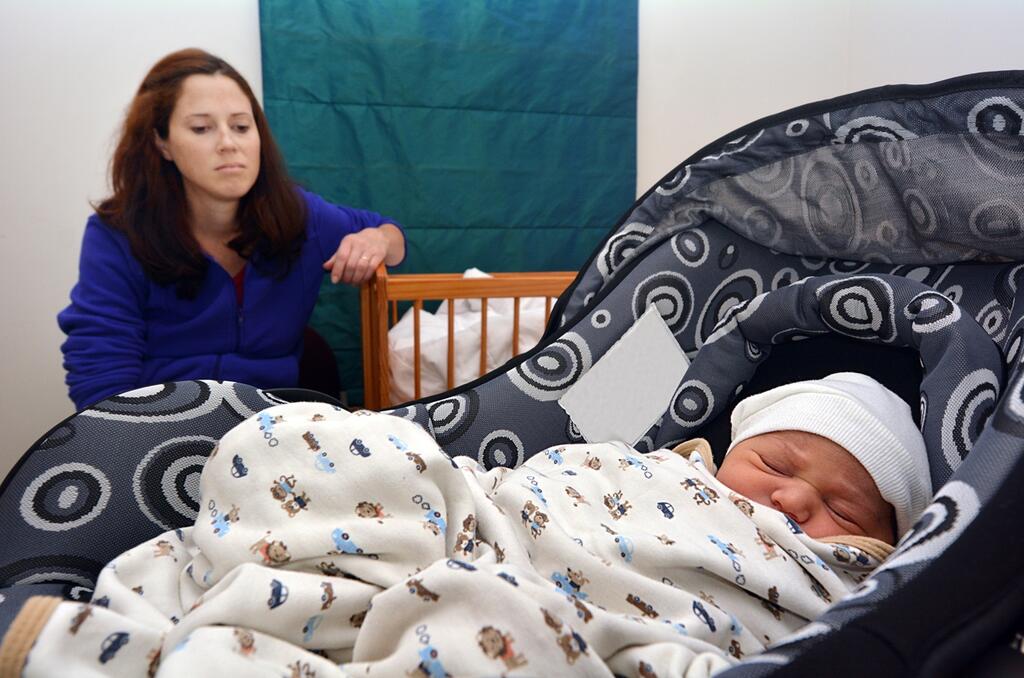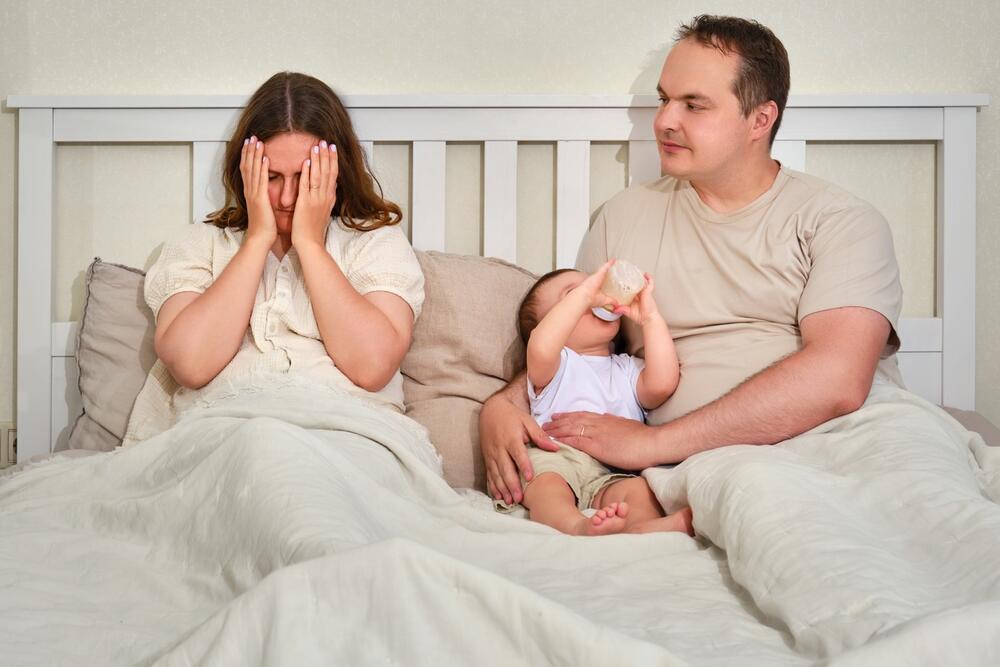Getting your Trinity Audio player ready...
Many young mothers struggle to enjoy their little bundle of joy. They’re haunted by feelings of uncertainty and even stress.
Read more:
Prof. Tzachi Ein-Dor from the Ivcher School of Psychology at Reichman University, and Gal Levin, a master's degree holder in clinical psychology and a biofeedback trainer, are hopeful in this regard. At least, that's their current goal.
As part of Levin's doctoral work, supervised by Prof. Ein-Dor, they gathered the most recent and groundbreaking research in the field, consolidating them into a model that for the first time links the causes of postpartum depression to symptoms, thus enabling personalized treatment and even prevention.
"This model is innovative because it succeeds in explaining what hasn't been achieved to date - the diversity of symptoms in postpartum depression, why certain women develop it while others do not, and how genes and prior life events influence this variance," explains Levin.
According to the model, three systems are involved in the process: the immune system, the stress system, and the oxytocin system. "When these systems are out of balance, we see the symptoms that characterize postpartum depression. Each one alone can cause depression to a certain extent, and when they all occur together, it's a kind of 'perfect storm,' leading to more severe symptoms," explains Levin.
To better understand the process, Levin likens our mental state to a plant: "It needs a certain amount of sun, water, and soil to grow, but if exposed to direct, hot sun all day, it will wither; if overwatered, its roots will drown. Similarly, we need different things in specific amounts and up to a certain limit. For example, a certain amount of stress is necessary for us to react – if a lion is chasing us in the savanna, we want to be stressed and run – but too much stress throws the system out of balance and hampers the development of an organism, be it a plant or a human."
Returning to Chernobyl
The first and most obvious question is what motivates two men to delve into a field that traditionally belongs to women, and in fact, even they often avoid engaging in or discussing. "I am a parent to four children," says Prof. Ein-Dor.
"In the past, there were also two miscarriages and a stillbirth, so I was exposed to the rates of miscarriages and stillbirths, as well as to pregnancies where everything went smoothly, but then the hard feelings known as postpartum depression arrived - and it's worth noting that these feelings occur not only among women who have given birth but also among men. Although according to the data, women suffer twice as much from postpartum depression, considering that about 35,000 women in Israel experience postpartum depression each year, it's a significant number."
Levin shares that his interest in the subject began when his wife became pregnant. "I have a master's degree in child psychology, so it was inevitable for me to deal with this - not to mention that everyone wants their partner to be happy and to minimize as much as possible the chance of her developing symptoms of depression."
What is the actual difference between regular depression and postpartum depression?
Levin: "First of all, it's important to clarify that it's not just depression after childbirth, but around childbirth. It can develop in the last months of pregnancy, and it can occur even several months after childbirth.
In terms of symptoms, we see the same symptoms as regular depression, for example, inability to enjoy things, many negative thoughts, even about death, and perhaps even attempts at self-harm. But in addition, there are also symptoms related to the small and cute creature that has been added, such as rejection, decrease in the desire to interact with the baby."
"While theoretically, and I hope it's not the case, depression can be experienced alone, here, by definition, a helpless family and baby are involved," adds Prof. Ein-Dor.
"Therefore, the impact of perinatal depression is significantly greater, and in severe cases, untreated depression can even lead to death, either as a result of the mother's despair or from the neglect of the baby. In addition, as we've already mentioned, it has an incredible prevalence."
Despite the high numbers, there is still significant underdiagnosis of perinatal depression. "Many times it is confused with a phenomenon called 'baby blues,' which is a kind of letdown after childbirth," Levin clarifies. "It's also an entire family of disorders. Some women have certain symptoms and others have different ones, and this is what also complicates the identification itself and certainly the treatment."
Following the model and its findings, Prof. Ein-Dor compares the development of depression to a nuclear reactor accident. "The reactor is based on elements that push for the creation of steam in order to generate electricity, but there also have to be inhibitory factors in the process, like anti-reaction materials that help calm down or water that circulates to cool down.
As long as the reactor works well, we know how to generate electricity and nothing happens. The problem starts when the process becomes unbalanced, and then we have Chernobyl and radioactive poisoning."
And is the release of pressure achieved through medication?
"It can come in the form of medication, but we also know what inhibitors exist and how they work – through body-to-body contact, breastfeeding or social support a hormone called oxytocin is released, which was once referred to as the 'love hormone.' This hormone can inhibit both the stress system and the immune system.
For instance, due to events like an emergency C-section, which we know can promote postpartum depression, the woman avoids meeting people or holding her baby because it hurts, and then not only does she experience childbirth itself, which is a stressful event, she also doesn't use one of the main inhibitors of the process - and then starts the cycle that poisons the inner nuclear reactor we have, which could eventually lead to a 'Chernobyl'-like event."
The recipe for depression
At first glance, we might think that early detection and treatment will vastly improve the situation and nip depression in the bud, but even with treatment and professional guidance the symptoms can persist and even intensify. According to Levin, this is the result of a treatment that doesn't adequately match the specific situation.
"The model helps not only at the diagnostic level but also in treatment. Currently, all medications focus on the end of the process, but that endpoint might not be accurate. If you understand the whole path, you can intervene along the way in a more precise and correct manner according to the individual. We hear about personalized medicines today, and this is exactly it, customizing the medication with a few simple questions. Later on, in the larger project that Prof. Ein-Dor will initiate, this can be achieved through a simple saliva test, and then we even save those questions, the answers to which might be biased."
"And then we can get the interpretation months before the depression even breaks out," adds Prof. Ein-Dor.
How does it work?
Levin: "We know that we get our genes from our parents, and we have DNA that remains constant until death, but there's a mechanism on the DNA called epigenetics, which knows which genes will be expressed and which will not.
Today, based on saliva, we can get a person's epigenetic profile, their genetics, and the interaction between them. We can see, for instance, if they have had life events that caused an epigenetic signature, how that influences the DNA they were born with, and based on that determine whether that person will be more or less vulnerable to depression.
"So, let's say two people encounter the same life events, like the death of a loved one: I will be able to say with relatively high probability, according to the genetic and epigenetic profile, which one of them is more likely to experience postpartum depression after this event, and also which of the mechanisms we discussed – stress, immune system, and lack of inhibitors.
Furthermore, I can say that certain medications will be more effective for that person than others, because their stress system is very active compared to their immune system, or vice versa."
So the ultimate goal is for every couple planning a pregnancy to undergo genetic and epigenetic testing beforehand, in an attempt to prevent depression?
Prof. Ein-Dor: "Yes. It's no longer expensive to get a genetic test, it's not intrusive and almost every couple is doing it today - so all that's needed is education to understand, just like if I have a tendency for diabetes in my family, I know I need to be more cautious and check myself. It's the same idea: if there's a potential that I carry a risk group for something, then preventive medicine is worth several times more than any treatment I would do afterward. The goal is not to experience that. Not to carry that with a baby. Not to enter into that event."







